Reflective Report: Influencing and Making Decisions in Organizations
VerifiedAdded on 2020/05/04
|15
|3564
|55
Report
AI Summary
This report delves into the multifaceted realm of decision-making, a critical process for both individuals and organizations. It begins with an executive summary highlighting the significance of decision-making and its application across various scenarios. The report then explores the core concept of decision-making, detailing cognitive processes, and different types of decision-making including rational and intuitive approaches. It examines the role of heuristics, various decision-making models like bounded rationality, sequential attention, and retrospective models. Furthermore, the report discusses decision-making tools and techniques, offering a comprehensive understanding of how to make informed choices. Through reflective experiences, the report provides insights into individual decision-making styles, the interplay of intuition and rationality, and the practical application of decision-making theories in real-world scenarios. The report concludes with a summary of the key findings and implications for effective decision-making in leadership and management contexts.
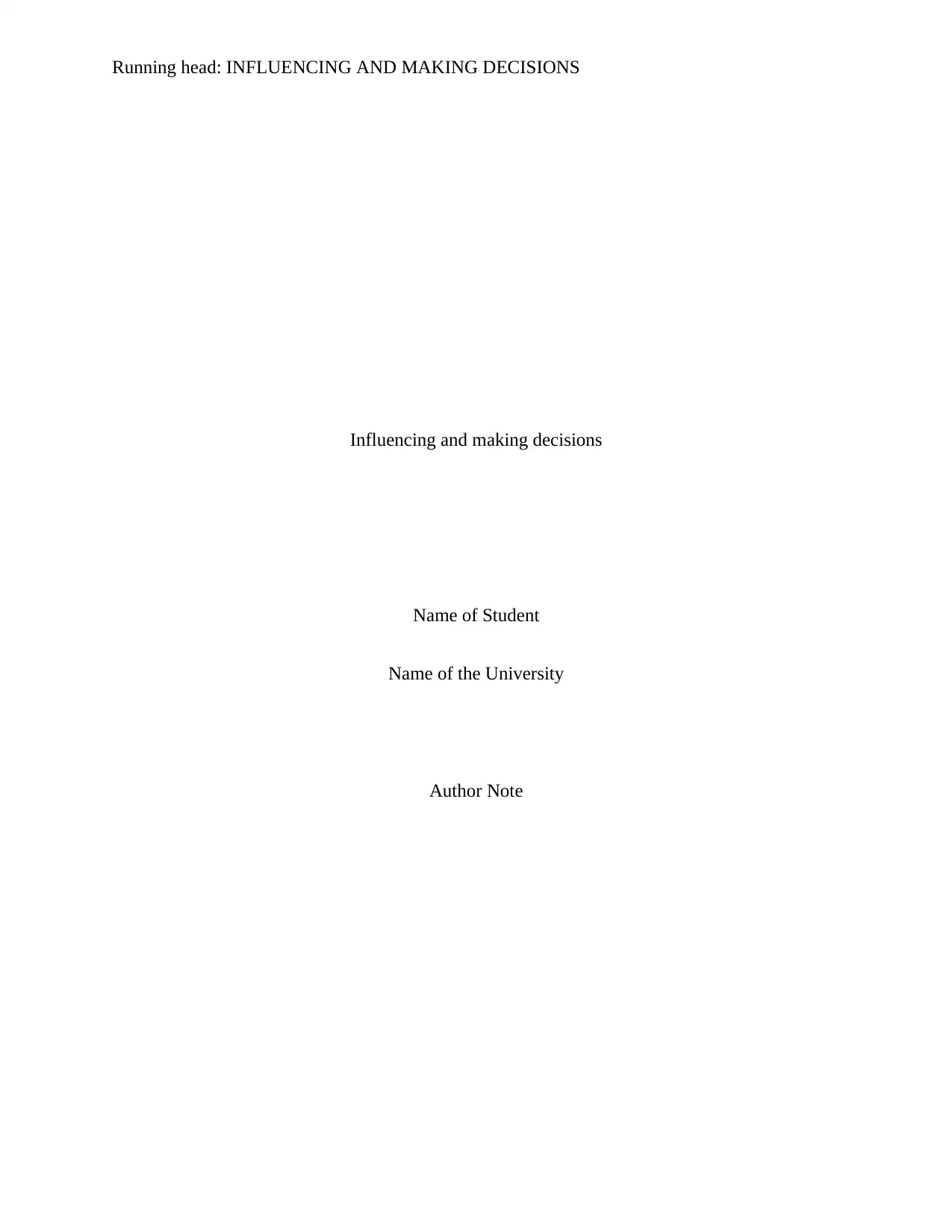
Running head: INFLUENCING AND MAKING DECISIONS
Influencing and making decisions
Name of Student
Name of the University
Author Note
Influencing and making decisions
Name of Student
Name of the University
Author Note
Paraphrase This Document
Need a fresh take? Get an instant paraphrase of this document with our AI Paraphraser
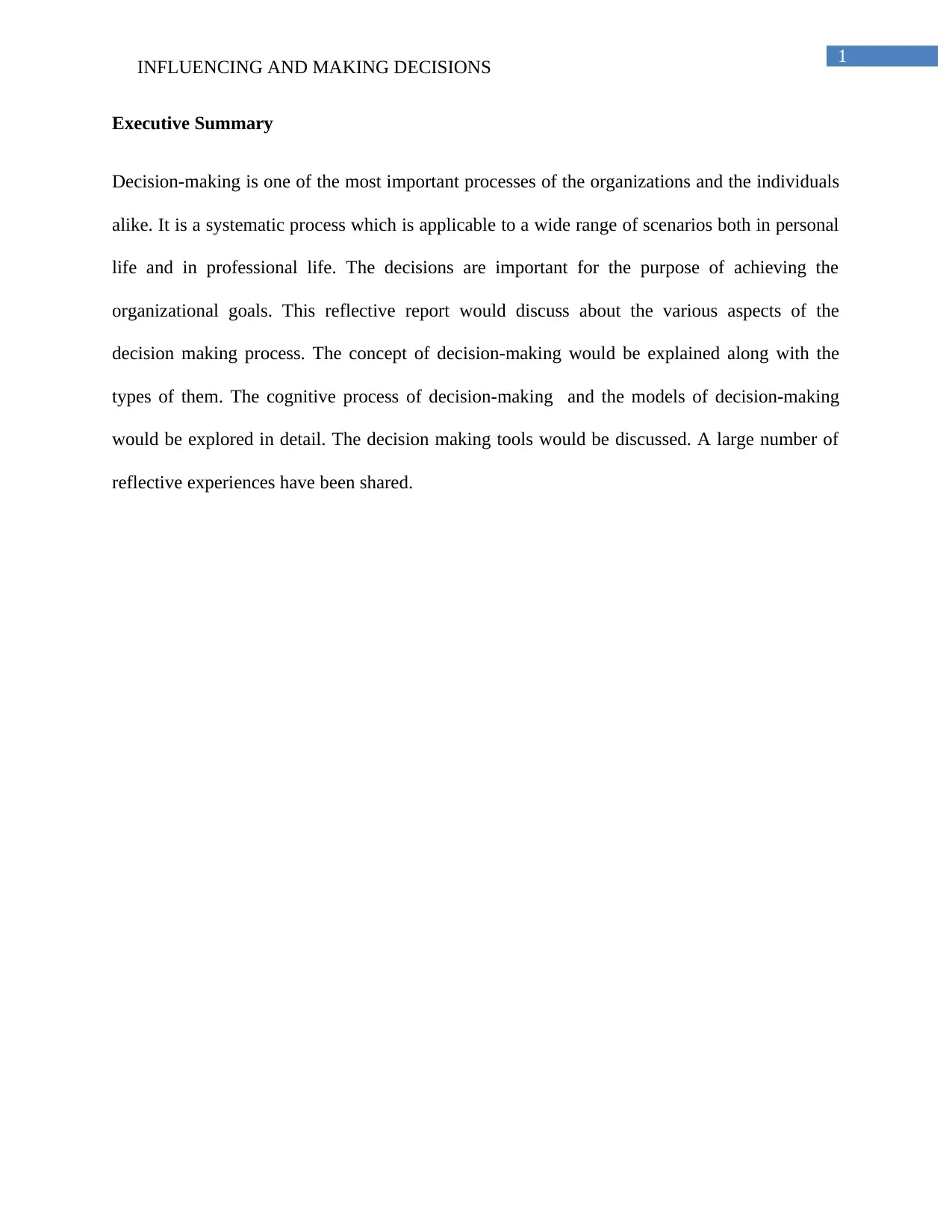
1
INFLUENCING AND MAKING DECISIONS
Executive Summary
Decision-making is one of the most important processes of the organizations and the individuals
alike. It is a systematic process which is applicable to a wide range of scenarios both in personal
life and in professional life. The decisions are important for the purpose of achieving the
organizational goals. This reflective report would discuss about the various aspects of the
decision making process. The concept of decision-making would be explained along with the
types of them. The cognitive process of decision-making and the models of decision-making
would be explored in detail. The decision making tools would be discussed. A large number of
reflective experiences have been shared.
INFLUENCING AND MAKING DECISIONS
Executive Summary
Decision-making is one of the most important processes of the organizations and the individuals
alike. It is a systematic process which is applicable to a wide range of scenarios both in personal
life and in professional life. The decisions are important for the purpose of achieving the
organizational goals. This reflective report would discuss about the various aspects of the
decision making process. The concept of decision-making would be explained along with the
types of them. The cognitive process of decision-making and the models of decision-making
would be explored in detail. The decision making tools would be discussed. A large number of
reflective experiences have been shared.
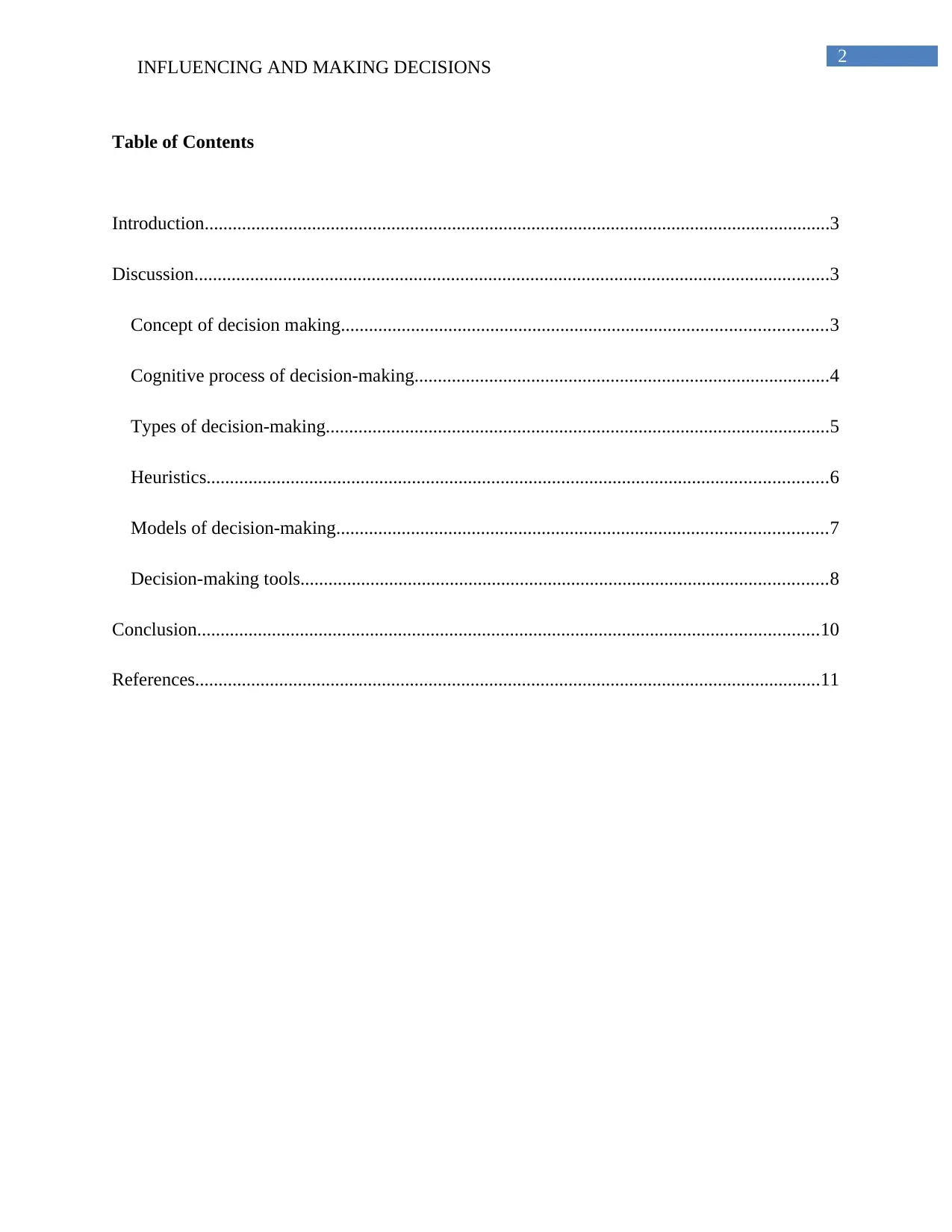
2
INFLUENCING AND MAKING DECISIONS
Table of Contents
Introduction......................................................................................................................................3
Discussion........................................................................................................................................3
Concept of decision making........................................................................................................3
Cognitive process of decision-making.........................................................................................4
Types of decision-making............................................................................................................5
Heuristics.....................................................................................................................................6
Models of decision-making.........................................................................................................7
Decision-making tools.................................................................................................................8
Conclusion.....................................................................................................................................10
References......................................................................................................................................11
INFLUENCING AND MAKING DECISIONS
Table of Contents
Introduction......................................................................................................................................3
Discussion........................................................................................................................................3
Concept of decision making........................................................................................................3
Cognitive process of decision-making.........................................................................................4
Types of decision-making............................................................................................................5
Heuristics.....................................................................................................................................6
Models of decision-making.........................................................................................................7
Decision-making tools.................................................................................................................8
Conclusion.....................................................................................................................................10
References......................................................................................................................................11
⊘ This is a preview!⊘
Do you want full access?
Subscribe today to unlock all pages.

Trusted by 1+ million students worldwide
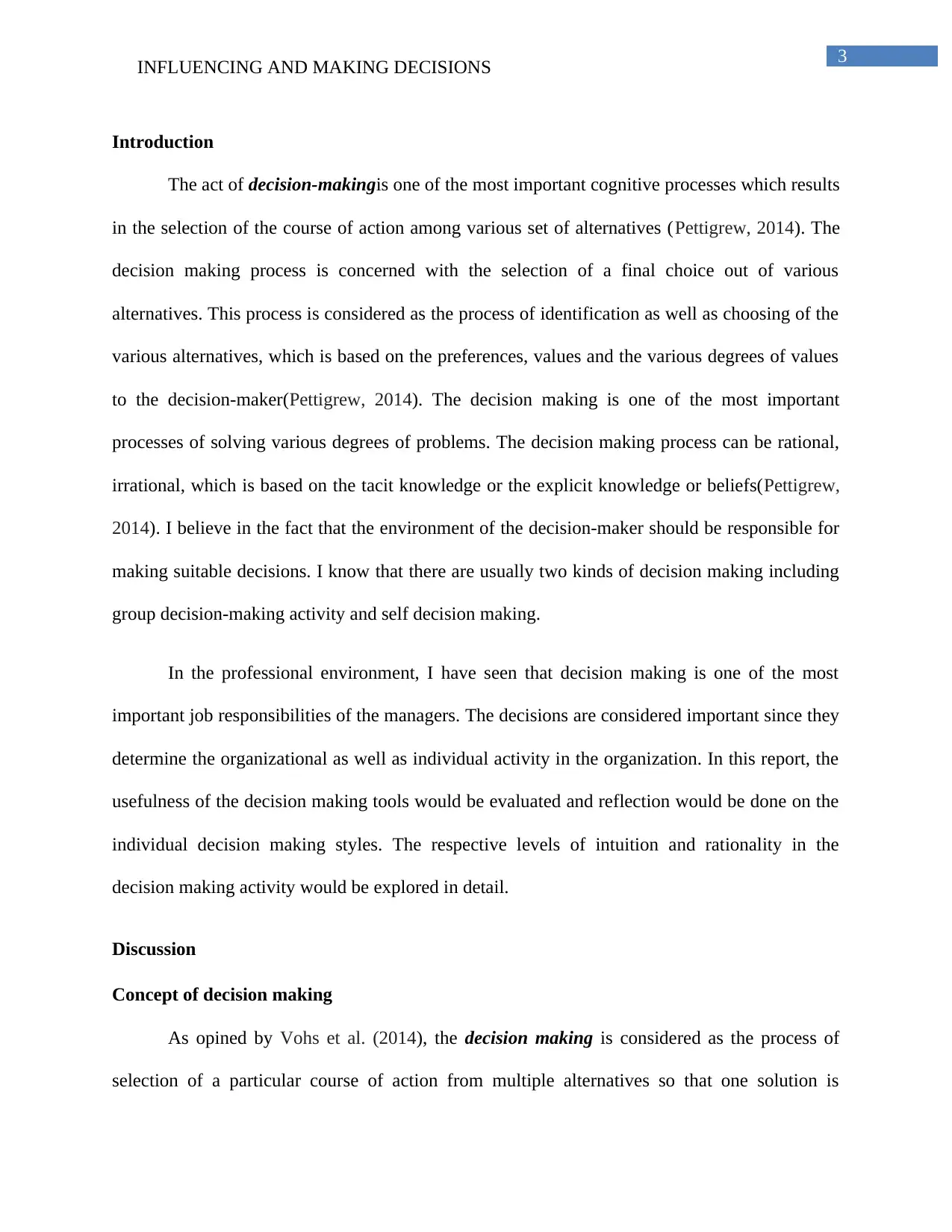
3
INFLUENCING AND MAKING DECISIONS
Introduction
The act of decision-makingis one of the most important cognitive processes which results
in the selection of the course of action among various set of alternatives (Pettigrew, 2014). The
decision making process is concerned with the selection of a final choice out of various
alternatives. This process is considered as the process of identification as well as choosing of the
various alternatives, which is based on the preferences, values and the various degrees of values
to the decision-maker(Pettigrew, 2014). The decision making is one of the most important
processes of solving various degrees of problems. The decision making process can be rational,
irrational, which is based on the tacit knowledge or the explicit knowledge or beliefs(Pettigrew,
2014). I believe in the fact that the environment of the decision-maker should be responsible for
making suitable decisions. I know that there are usually two kinds of decision making including
group decision-making activity and self decision making.
In the professional environment, I have seen that decision making is one of the most
important job responsibilities of the managers. The decisions are considered important since they
determine the organizational as well as individual activity in the organization. In this report, the
usefulness of the decision making tools would be evaluated and reflection would be done on the
individual decision making styles. The respective levels of intuition and rationality in the
decision making activity would be explored in detail.
Discussion
Concept of decision making
As opined by Vohs et al. (2014), the decision making is considered as the process of
selection of a particular course of action from multiple alternatives so that one solution is
INFLUENCING AND MAKING DECISIONS
Introduction
The act of decision-makingis one of the most important cognitive processes which results
in the selection of the course of action among various set of alternatives (Pettigrew, 2014). The
decision making process is concerned with the selection of a final choice out of various
alternatives. This process is considered as the process of identification as well as choosing of the
various alternatives, which is based on the preferences, values and the various degrees of values
to the decision-maker(Pettigrew, 2014). The decision making is one of the most important
processes of solving various degrees of problems. The decision making process can be rational,
irrational, which is based on the tacit knowledge or the explicit knowledge or beliefs(Pettigrew,
2014). I believe in the fact that the environment of the decision-maker should be responsible for
making suitable decisions. I know that there are usually two kinds of decision making including
group decision-making activity and self decision making.
In the professional environment, I have seen that decision making is one of the most
important job responsibilities of the managers. The decisions are considered important since they
determine the organizational as well as individual activity in the organization. In this report, the
usefulness of the decision making tools would be evaluated and reflection would be done on the
individual decision making styles. The respective levels of intuition and rationality in the
decision making activity would be explored in detail.
Discussion
Concept of decision making
As opined by Vohs et al. (2014), the decision making is considered as the process of
selection of a particular course of action from multiple alternatives so that one solution is
Paraphrase This Document
Need a fresh take? Get an instant paraphrase of this document with our AI Paraphraser
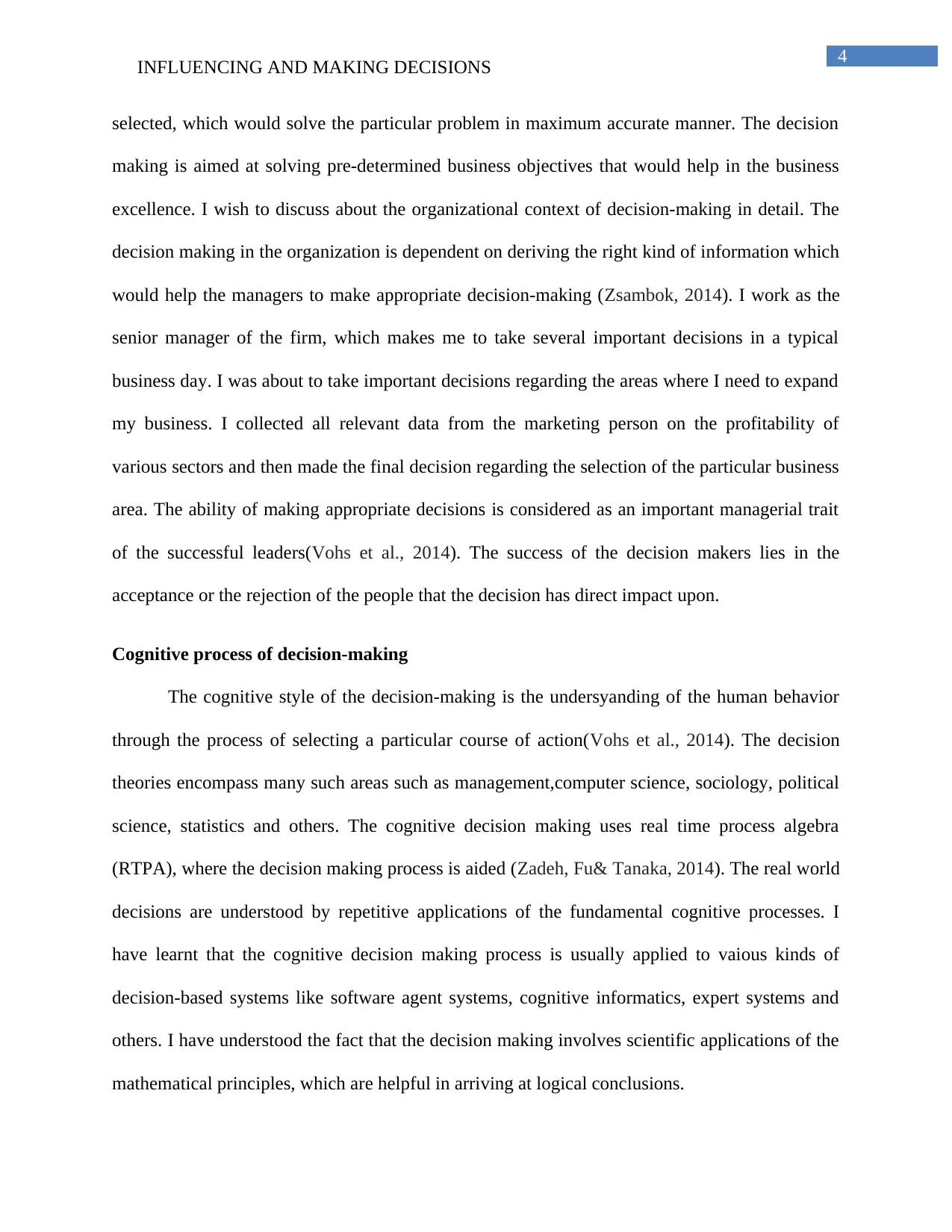
4
INFLUENCING AND MAKING DECISIONS
selected, which would solve the particular problem in maximum accurate manner. The decision
making is aimed at solving pre-determined business objectives that would help in the business
excellence. I wish to discuss about the organizational context of decision-making in detail. The
decision making in the organization is dependent on deriving the right kind of information which
would help the managers to make appropriate decision-making (Zsambok, 2014). I work as the
senior manager of the firm, which makes me to take several important decisions in a typical
business day. I was about to take important decisions regarding the areas where I need to expand
my business. I collected all relevant data from the marketing person on the profitability of
various sectors and then made the final decision regarding the selection of the particular business
area. The ability of making appropriate decisions is considered as an important managerial trait
of the successful leaders(Vohs et al., 2014). The success of the decision makers lies in the
acceptance or the rejection of the people that the decision has direct impact upon.
Cognitive process of decision-making
The cognitive style of the decision-making is the undersyanding of the human behavior
through the process of selecting a particular course of action(Vohs et al., 2014). The decision
theories encompass many such areas such as management,computer science, sociology, political
science, statistics and others. The cognitive decision making uses real time process algebra
(RTPA), where the decision making process is aided (Zadeh, Fu& Tanaka, 2014). The real world
decisions are understood by repetitive applications of the fundamental cognitive processes. I
have learnt that the cognitive decision making process is usually applied to vaious kinds of
decision-based systems like software agent systems, cognitive informatics, expert systems and
others. I have understood the fact that the decision making involves scientific applications of the
mathematical principles, which are helpful in arriving at logical conclusions.
INFLUENCING AND MAKING DECISIONS
selected, which would solve the particular problem in maximum accurate manner. The decision
making is aimed at solving pre-determined business objectives that would help in the business
excellence. I wish to discuss about the organizational context of decision-making in detail. The
decision making in the organization is dependent on deriving the right kind of information which
would help the managers to make appropriate decision-making (Zsambok, 2014). I work as the
senior manager of the firm, which makes me to take several important decisions in a typical
business day. I was about to take important decisions regarding the areas where I need to expand
my business. I collected all relevant data from the marketing person on the profitability of
various sectors and then made the final decision regarding the selection of the particular business
area. The ability of making appropriate decisions is considered as an important managerial trait
of the successful leaders(Vohs et al., 2014). The success of the decision makers lies in the
acceptance or the rejection of the people that the decision has direct impact upon.
Cognitive process of decision-making
The cognitive style of the decision-making is the undersyanding of the human behavior
through the process of selecting a particular course of action(Vohs et al., 2014). The decision
theories encompass many such areas such as management,computer science, sociology, political
science, statistics and others. The cognitive decision making uses real time process algebra
(RTPA), where the decision making process is aided (Zadeh, Fu& Tanaka, 2014). The real world
decisions are understood by repetitive applications of the fundamental cognitive processes. I
have learnt that the cognitive decision making process is usually applied to vaious kinds of
decision-based systems like software agent systems, cognitive informatics, expert systems and
others. I have understood the fact that the decision making involves scientific applications of the
mathematical principles, which are helpful in arriving at logical conclusions.
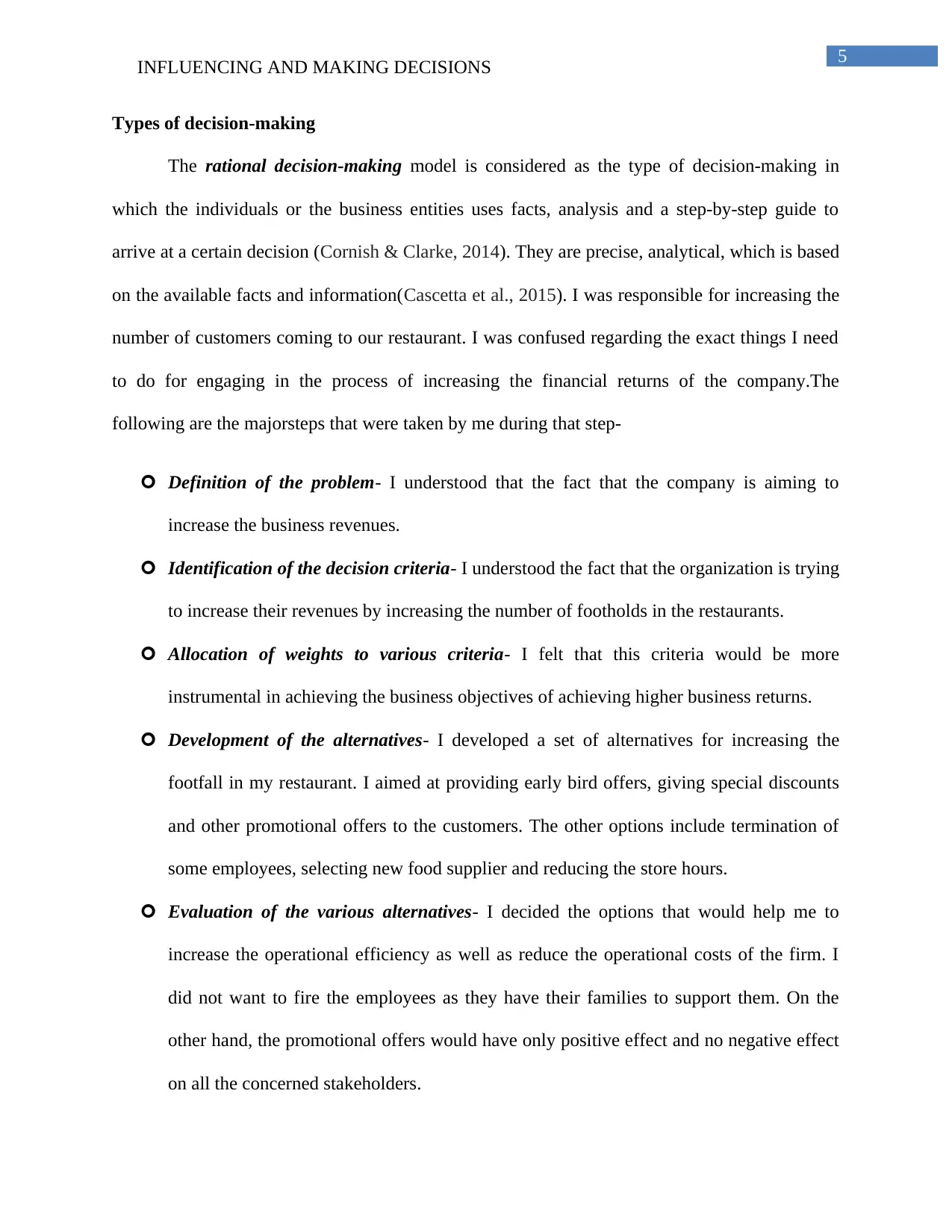
5
INFLUENCING AND MAKING DECISIONS
Types of decision-making
The rational decision-making model is considered as the type of decision-making in
which the individuals or the business entities uses facts, analysis and a step-by-step guide to
arrive at a certain decision (Cornish & Clarke, 2014). They are precise, analytical, which is based
on the available facts and information(Cascetta et al., 2015). I was responsible for increasing the
number of customers coming to our restaurant. I was confused regarding the exact things I need
to do for engaging in the process of increasing the financial returns of the company.The
following are the majorsteps that were taken by me during that step-
Definition of the problem- I understood that the fact that the company is aiming to
increase the business revenues.
Identification of the decision criteria- I understood the fact that the organization is trying
to increase their revenues by increasing the number of footholds in the restaurants.
Allocation of weights to various criteria- I felt that this criteria would be more
instrumental in achieving the business objectives of achieving higher business returns.
Development of the alternatives- I developed a set of alternatives for increasing the
footfall in my restaurant. I aimed at providing early bird offers, giving special discounts
and other promotional offers to the customers. The other options include termination of
some employees, selecting new food supplier and reducing the store hours.
Evaluation of the various alternatives- I decided the options that would help me to
increase the operational efficiency as well as reduce the operational costs of the firm. I
did not want to fire the employees as they have their families to support them. On the
other hand, the promotional offers would have only positive effect and no negative effect
on all the concerned stakeholders.
INFLUENCING AND MAKING DECISIONS
Types of decision-making
The rational decision-making model is considered as the type of decision-making in
which the individuals or the business entities uses facts, analysis and a step-by-step guide to
arrive at a certain decision (Cornish & Clarke, 2014). They are precise, analytical, which is based
on the available facts and information(Cascetta et al., 2015). I was responsible for increasing the
number of customers coming to our restaurant. I was confused regarding the exact things I need
to do for engaging in the process of increasing the financial returns of the company.The
following are the majorsteps that were taken by me during that step-
Definition of the problem- I understood that the fact that the company is aiming to
increase the business revenues.
Identification of the decision criteria- I understood the fact that the organization is trying
to increase their revenues by increasing the number of footholds in the restaurants.
Allocation of weights to various criteria- I felt that this criteria would be more
instrumental in achieving the business objectives of achieving higher business returns.
Development of the alternatives- I developed a set of alternatives for increasing the
footfall in my restaurant. I aimed at providing early bird offers, giving special discounts
and other promotional offers to the customers. The other options include termination of
some employees, selecting new food supplier and reducing the store hours.
Evaluation of the various alternatives- I decided the options that would help me to
increase the operational efficiency as well as reduce the operational costs of the firm. I
did not want to fire the employees as they have their families to support them. On the
other hand, the promotional offers would have only positive effect and no negative effect
on all the concerned stakeholders.
⊘ This is a preview!⊘
Do you want full access?
Subscribe today to unlock all pages.

Trusted by 1+ million students worldwide
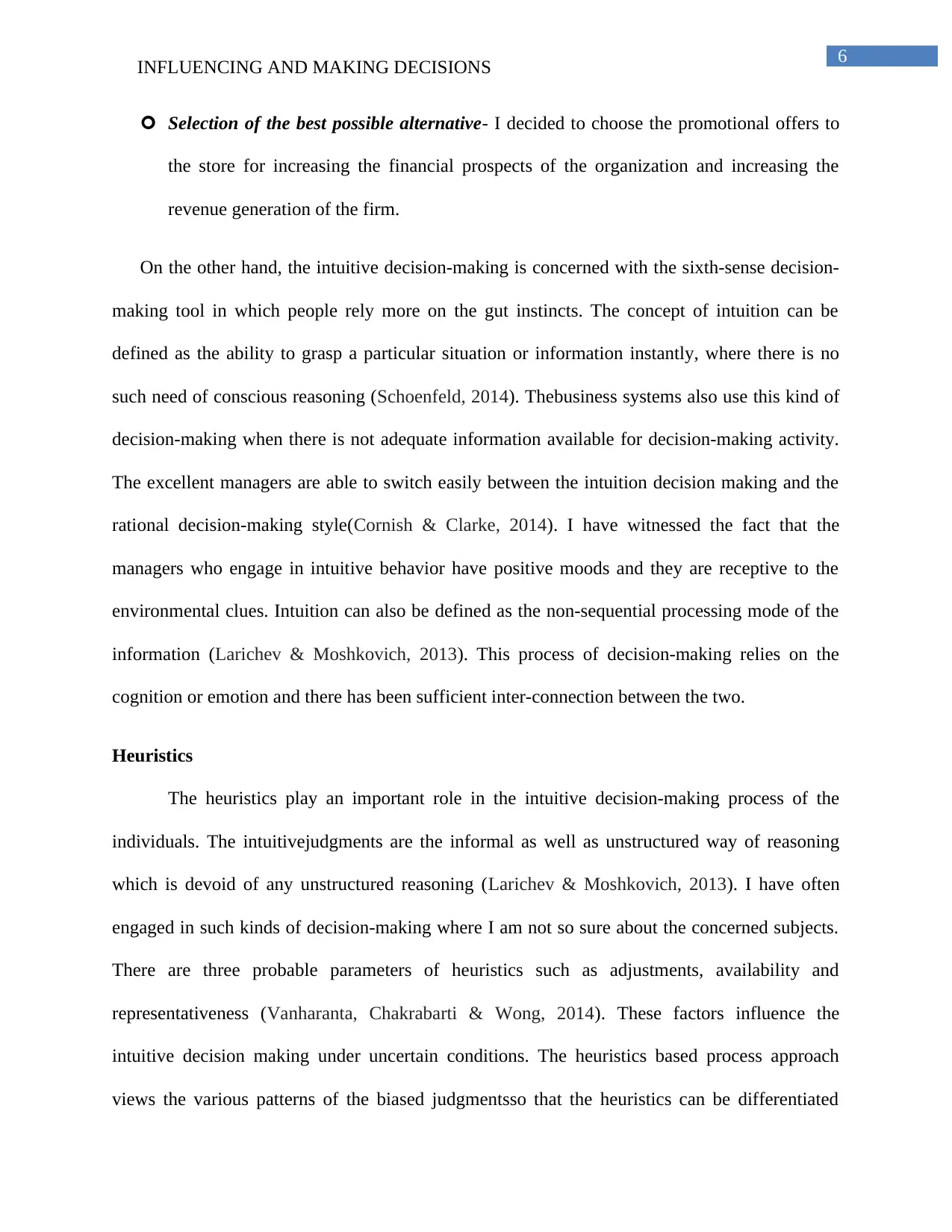
6
INFLUENCING AND MAKING DECISIONS
Selection of the best possible alternative- I decided to choose the promotional offers to
the store for increasing the financial prospects of the organization and increasing the
revenue generation of the firm.
On the other hand, the intuitive decision-making is concerned with the sixth-sense decision-
making tool in which people rely more on the gut instincts. The concept of intuition can be
defined as the ability to grasp a particular situation or information instantly, where there is no
such need of conscious reasoning (Schoenfeld, 2014). Thebusiness systems also use this kind of
decision-making when there is not adequate information available for decision-making activity.
The excellent managers are able to switch easily between the intuition decision making and the
rational decision-making style(Cornish & Clarke, 2014). I have witnessed the fact that the
managers who engage in intuitive behavior have positive moods and they are receptive to the
environmental clues. Intuition can also be defined as the non-sequential processing mode of the
information (Larichev & Moshkovich, 2013). This process of decision-making relies on the
cognition or emotion and there has been sufficient inter-connection between the two.
Heuristics
The heuristics play an important role in the intuitive decision-making process of the
individuals. The intuitivejudgments are the informal as well as unstructured way of reasoning
which is devoid of any unstructured reasoning (Larichev & Moshkovich, 2013). I have often
engaged in such kinds of decision-making where I am not so sure about the concerned subjects.
There are three probable parameters of heuristics such as adjustments, availability and
representativeness (Vanharanta, Chakrabarti & Wong, 2014). These factors influence the
intuitive decision making under uncertain conditions. The heuristics based process approach
views the various patterns of the biased judgmentsso that the heuristics can be differentiated
INFLUENCING AND MAKING DECISIONS
Selection of the best possible alternative- I decided to choose the promotional offers to
the store for increasing the financial prospects of the organization and increasing the
revenue generation of the firm.
On the other hand, the intuitive decision-making is concerned with the sixth-sense decision-
making tool in which people rely more on the gut instincts. The concept of intuition can be
defined as the ability to grasp a particular situation or information instantly, where there is no
such need of conscious reasoning (Schoenfeld, 2014). Thebusiness systems also use this kind of
decision-making when there is not adequate information available for decision-making activity.
The excellent managers are able to switch easily between the intuition decision making and the
rational decision-making style(Cornish & Clarke, 2014). I have witnessed the fact that the
managers who engage in intuitive behavior have positive moods and they are receptive to the
environmental clues. Intuition can also be defined as the non-sequential processing mode of the
information (Larichev & Moshkovich, 2013). This process of decision-making relies on the
cognition or emotion and there has been sufficient inter-connection between the two.
Heuristics
The heuristics play an important role in the intuitive decision-making process of the
individuals. The intuitivejudgments are the informal as well as unstructured way of reasoning
which is devoid of any unstructured reasoning (Larichev & Moshkovich, 2013). I have often
engaged in such kinds of decision-making where I am not so sure about the concerned subjects.
There are three probable parameters of heuristics such as adjustments, availability and
representativeness (Vanharanta, Chakrabarti & Wong, 2014). These factors influence the
intuitive decision making under uncertain conditions. The heuristics based process approach
views the various patterns of the biased judgmentsso that the heuristics can be differentiated
Paraphrase This Document
Need a fresh take? Get an instant paraphrase of this document with our AI Paraphraser
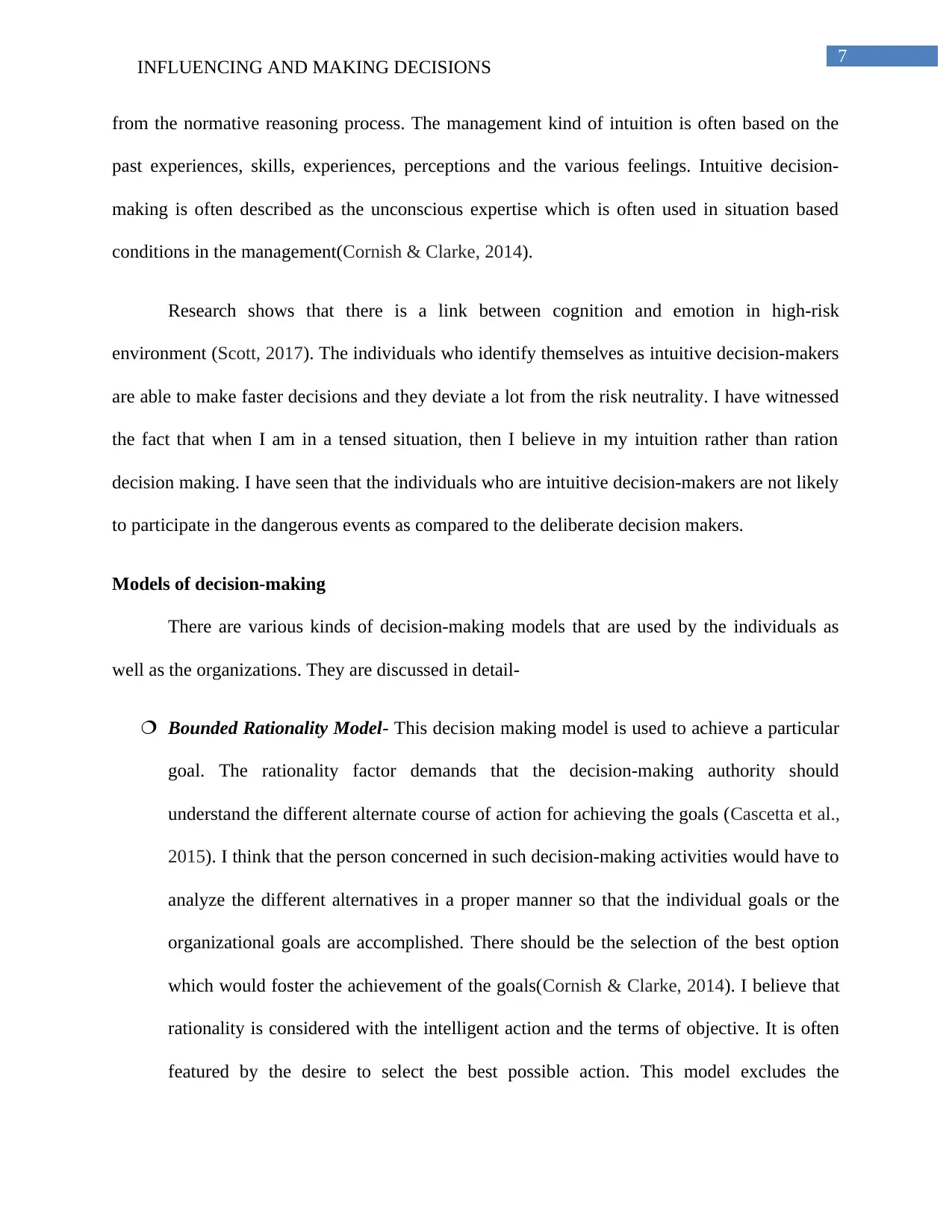
7
INFLUENCING AND MAKING DECISIONS
from the normative reasoning process. The management kind of intuition is often based on the
past experiences, skills, experiences, perceptions and the various feelings. Intuitive decision-
making is often described as the unconscious expertise which is often used in situation based
conditions in the management(Cornish & Clarke, 2014).
Research shows that there is a link between cognition and emotion in high-risk
environment (Scott, 2017). The individuals who identify themselves as intuitive decision-makers
are able to make faster decisions and they deviate a lot from the risk neutrality. I have witnessed
the fact that when I am in a tensed situation, then I believe in my intuition rather than ration
decision making. I have seen that the individuals who are intuitive decision-makers are not likely
to participate in the dangerous events as compared to the deliberate decision makers.
Models of decision-making
There are various kinds of decision-making models that are used by the individuals as
well as the organizations. They are discussed in detail-
Bounded Rationality Model- This decision making model is used to achieve a particular
goal. The rationality factor demands that the decision-making authority should
understand the different alternate course of action for achieving the goals (Cascetta et al.,
2015). I think that the person concerned in such decision-making activities would have to
analyze the different alternatives in a proper manner so that the individual goals or the
organizational goals are accomplished. There should be the selection of the best option
which would foster the achievement of the goals(Cornish & Clarke, 2014). I believe that
rationality is considered with the intelligent action and the terms of objective. It is often
featured by the desire to select the best possible action. This model excludes the
INFLUENCING AND MAKING DECISIONS
from the normative reasoning process. The management kind of intuition is often based on the
past experiences, skills, experiences, perceptions and the various feelings. Intuitive decision-
making is often described as the unconscious expertise which is often used in situation based
conditions in the management(Cornish & Clarke, 2014).
Research shows that there is a link between cognition and emotion in high-risk
environment (Scott, 2017). The individuals who identify themselves as intuitive decision-makers
are able to make faster decisions and they deviate a lot from the risk neutrality. I have witnessed
the fact that when I am in a tensed situation, then I believe in my intuition rather than ration
decision making. I have seen that the individuals who are intuitive decision-makers are not likely
to participate in the dangerous events as compared to the deliberate decision makers.
Models of decision-making
There are various kinds of decision-making models that are used by the individuals as
well as the organizations. They are discussed in detail-
Bounded Rationality Model- This decision making model is used to achieve a particular
goal. The rationality factor demands that the decision-making authority should
understand the different alternate course of action for achieving the goals (Cascetta et al.,
2015). I think that the person concerned in such decision-making activities would have to
analyze the different alternatives in a proper manner so that the individual goals or the
organizational goals are accomplished. There should be the selection of the best option
which would foster the achievement of the goals(Cornish & Clarke, 2014). I believe that
rationality is considered with the intelligent action and the terms of objective. It is often
featured by the desire to select the best possible action. This model excludes the
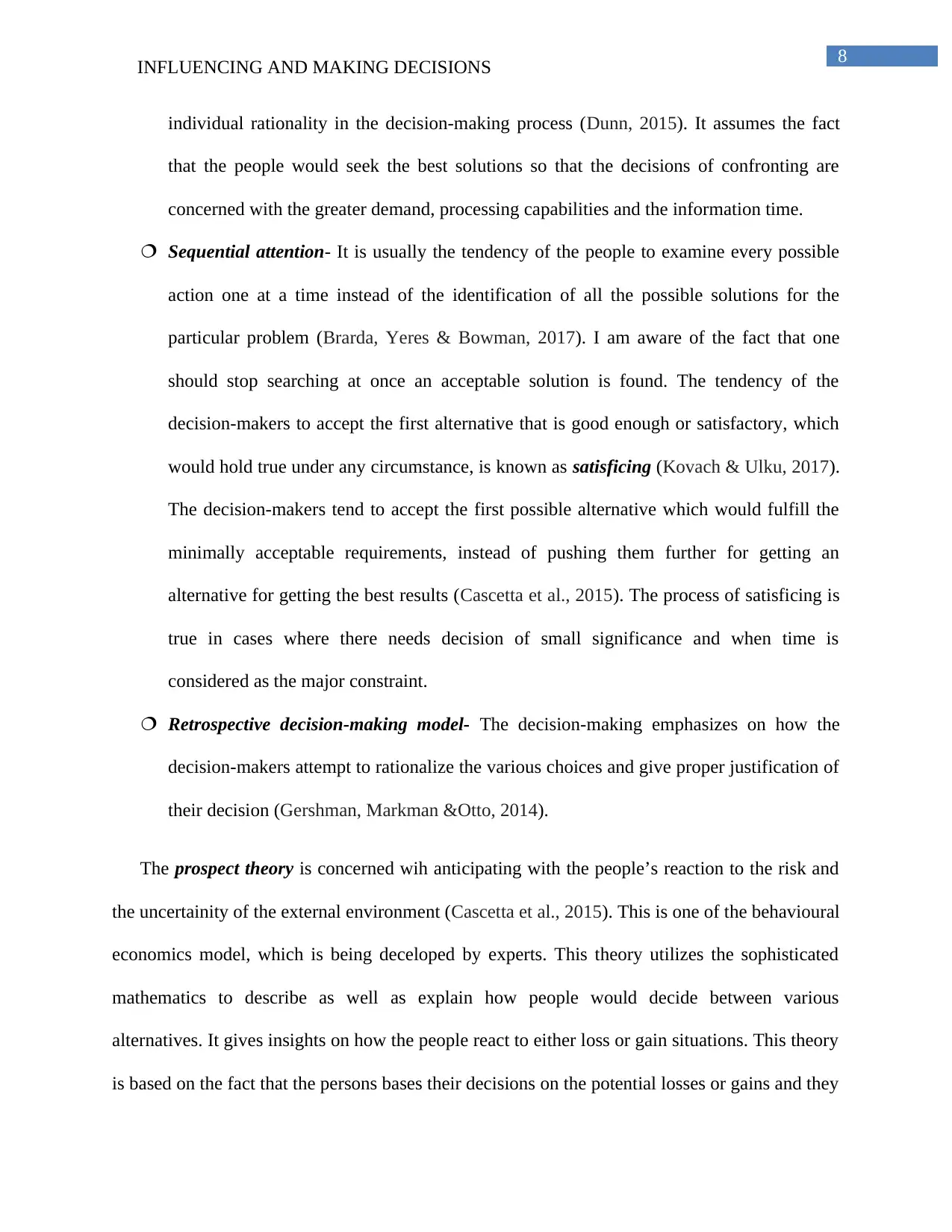
8
INFLUENCING AND MAKING DECISIONS
individual rationality in the decision-making process (Dunn, 2015). It assumes the fact
that the people would seek the best solutions so that the decisions of confronting are
concerned with the greater demand, processing capabilities and the information time.
Sequential attention- It is usually the tendency of the people to examine every possible
action one at a time instead of the identification of all the possible solutions for the
particular problem (Brarda, Yeres & Bowman, 2017). I am aware of the fact that one
should stop searching at once an acceptable solution is found. The tendency of the
decision-makers to accept the first alternative that is good enough or satisfactory, which
would hold true under any circumstance, is known as satisficing (Kovach & Ulku, 2017).
The decision-makers tend to accept the first possible alternative which would fulfill the
minimally acceptable requirements, instead of pushing them further for getting an
alternative for getting the best results (Cascetta et al., 2015). The process of satisficing is
true in cases where there needs decision of small significance and when time is
considered as the major constraint.
Retrospective decision-making model- The decision-making emphasizes on how the
decision-makers attempt to rationalize the various choices and give proper justification of
their decision (Gershman, Markman &Otto, 2014).
The prospect theory is concerned wih anticipating with the people’s reaction to the risk and
the uncertainity of the external environment (Cascetta et al., 2015). This is one of the behavioural
economics model, which is being deceloped by experts. This theory utilizes the sophisticated
mathematics to describe as well as explain how people would decide between various
alternatives. It gives insights on how the people react to either loss or gain situations. This theory
is based on the fact that the persons bases their decisions on the potential losses or gains and they
INFLUENCING AND MAKING DECISIONS
individual rationality in the decision-making process (Dunn, 2015). It assumes the fact
that the people would seek the best solutions so that the decisions of confronting are
concerned with the greater demand, processing capabilities and the information time.
Sequential attention- It is usually the tendency of the people to examine every possible
action one at a time instead of the identification of all the possible solutions for the
particular problem (Brarda, Yeres & Bowman, 2017). I am aware of the fact that one
should stop searching at once an acceptable solution is found. The tendency of the
decision-makers to accept the first alternative that is good enough or satisfactory, which
would hold true under any circumstance, is known as satisficing (Kovach & Ulku, 2017).
The decision-makers tend to accept the first possible alternative which would fulfill the
minimally acceptable requirements, instead of pushing them further for getting an
alternative for getting the best results (Cascetta et al., 2015). The process of satisficing is
true in cases where there needs decision of small significance and when time is
considered as the major constraint.
Retrospective decision-making model- The decision-making emphasizes on how the
decision-makers attempt to rationalize the various choices and give proper justification of
their decision (Gershman, Markman &Otto, 2014).
The prospect theory is concerned wih anticipating with the people’s reaction to the risk and
the uncertainity of the external environment (Cascetta et al., 2015). This is one of the behavioural
economics model, which is being deceloped by experts. This theory utilizes the sophisticated
mathematics to describe as well as explain how people would decide between various
alternatives. It gives insights on how the people react to either loss or gain situations. This theory
is based on the fact that the persons bases their decisions on the potential losses or gains and they
⊘ This is a preview!⊘
Do you want full access?
Subscribe today to unlock all pages.

Trusted by 1+ million students worldwide
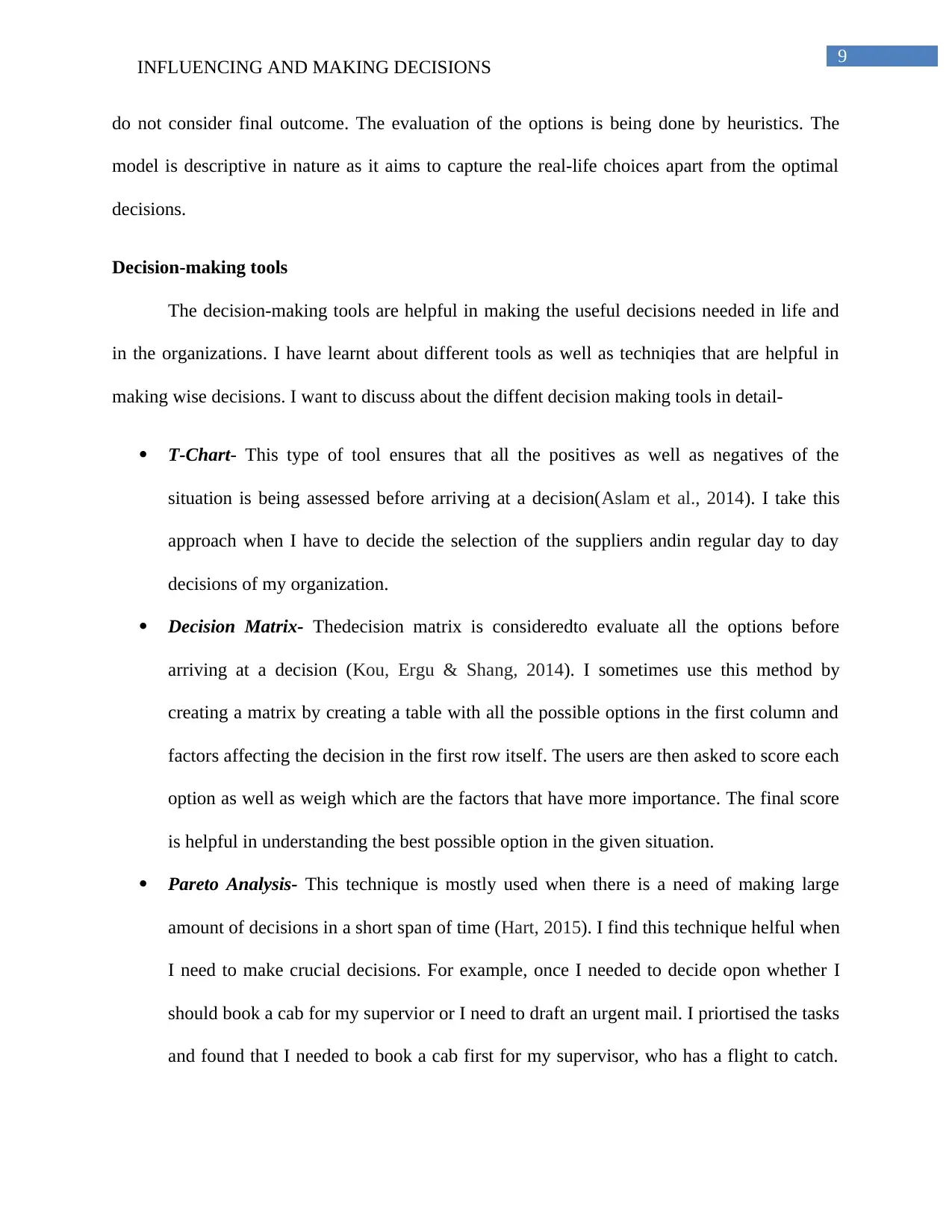
9
INFLUENCING AND MAKING DECISIONS
do not consider final outcome. The evaluation of the options is being done by heuristics. The
model is descriptive in nature as it aims to capture the real-life choices apart from the optimal
decisions.
Decision-making tools
The decision-making tools are helpful in making the useful decisions needed in life and
in the organizations. I have learnt about different tools as well as techniqies that are helpful in
making wise decisions. I want to discuss about the diffent decision making tools in detail-
T-Chart- This type of tool ensures that all the positives as well as negatives of the
situation is being assessed before arriving at a decision(Aslam et al., 2014). I take this
approach when I have to decide the selection of the suppliers andin regular day to day
decisions of my organization.
Decision Matrix- Thedecision matrix is consideredto evaluate all the options before
arriving at a decision (Kou, Ergu & Shang, 2014). I sometimes use this method by
creating a matrix by creating a table with all the possible options in the first column and
factors affecting the decision in the first row itself. The users are then asked to score each
option as well as weigh which are the factors that have more importance. The final score
is helpful in understanding the best possible option in the given situation.
Pareto Analysis- This technique is mostly used when there is a need of making large
amount of decisions in a short span of time (Hart, 2015). I find this technique helful when
I need to make crucial decisions. For example, once I needed to decide opon whether I
should book a cab for my supervior or I need to draft an urgent mail. I priortised the tasks
and found that I needed to book a cab first for my supervisor, who has a flight to catch.
INFLUENCING AND MAKING DECISIONS
do not consider final outcome. The evaluation of the options is being done by heuristics. The
model is descriptive in nature as it aims to capture the real-life choices apart from the optimal
decisions.
Decision-making tools
The decision-making tools are helpful in making the useful decisions needed in life and
in the organizations. I have learnt about different tools as well as techniqies that are helpful in
making wise decisions. I want to discuss about the diffent decision making tools in detail-
T-Chart- This type of tool ensures that all the positives as well as negatives of the
situation is being assessed before arriving at a decision(Aslam et al., 2014). I take this
approach when I have to decide the selection of the suppliers andin regular day to day
decisions of my organization.
Decision Matrix- Thedecision matrix is consideredto evaluate all the options before
arriving at a decision (Kou, Ergu & Shang, 2014). I sometimes use this method by
creating a matrix by creating a table with all the possible options in the first column and
factors affecting the decision in the first row itself. The users are then asked to score each
option as well as weigh which are the factors that have more importance. The final score
is helpful in understanding the best possible option in the given situation.
Pareto Analysis- This technique is mostly used when there is a need of making large
amount of decisions in a short span of time (Hart, 2015). I find this technique helful when
I need to make crucial decisions. For example, once I needed to decide opon whether I
should book a cab for my supervior or I need to draft an urgent mail. I priortised the tasks
and found that I needed to book a cab first for my supervisor, who has a flight to catch.
Paraphrase This Document
Need a fresh take? Get an instant paraphrase of this document with our AI Paraphraser
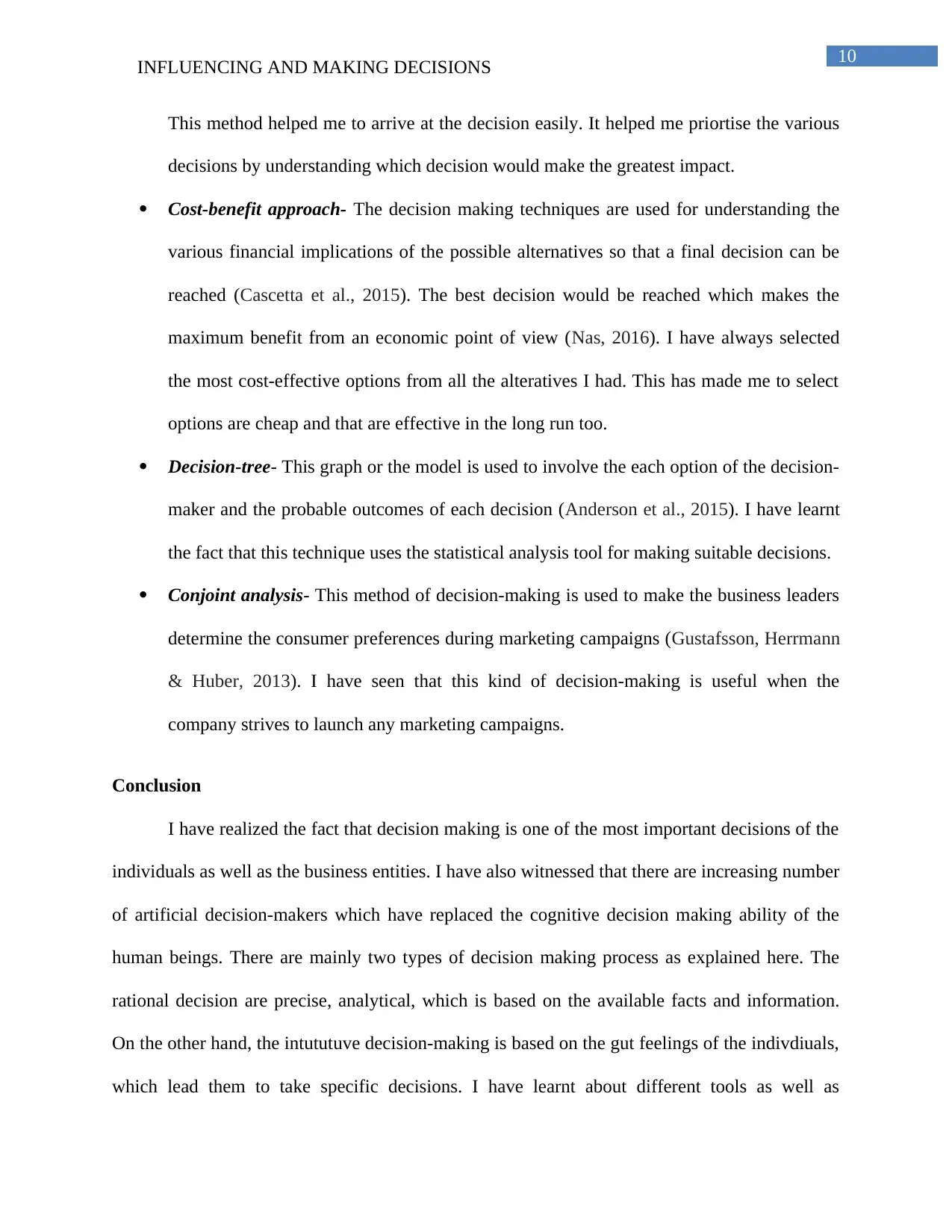
10
INFLUENCING AND MAKING DECISIONS
This method helped me to arrive at the decision easily. It helped me priortise the various
decisions by understanding which decision would make the greatest impact.
Cost-benefit approach- The decision making techniques are used for understanding the
various financial implications of the possible alternatives so that a final decision can be
reached (Cascetta et al., 2015). The best decision would be reached which makes the
maximum benefit from an economic point of view (Nas, 2016). I have always selected
the most cost-effective options from all the alteratives I had. This has made me to select
options are cheap and that are effective in the long run too.
Decision-tree- This graph or the model is used to involve the each option of the decision-
maker and the probable outcomes of each decision (Anderson et al., 2015). I have learnt
the fact that this technique uses the statistical analysis tool for making suitable decisions.
Conjoint analysis- This method of decision-making is used to make the business leaders
determine the consumer preferences during marketing campaigns (Gustafsson, Herrmann
& Huber, 2013). I have seen that this kind of decision-making is useful when the
company strives to launch any marketing campaigns.
Conclusion
I have realized the fact that decision making is one of the most important decisions of the
individuals as well as the business entities. I have also witnessed that there are increasing number
of artificial decision-makers which have replaced the cognitive decision making ability of the
human beings. There are mainly two types of decision making process as explained here. The
rational decision are precise, analytical, which is based on the available facts and information.
On the other hand, the intututuve decision-making is based on the gut feelings of the indivdiuals,
which lead them to take specific decisions. I have learnt about different tools as well as
INFLUENCING AND MAKING DECISIONS
This method helped me to arrive at the decision easily. It helped me priortise the various
decisions by understanding which decision would make the greatest impact.
Cost-benefit approach- The decision making techniques are used for understanding the
various financial implications of the possible alternatives so that a final decision can be
reached (Cascetta et al., 2015). The best decision would be reached which makes the
maximum benefit from an economic point of view (Nas, 2016). I have always selected
the most cost-effective options from all the alteratives I had. This has made me to select
options are cheap and that are effective in the long run too.
Decision-tree- This graph or the model is used to involve the each option of the decision-
maker and the probable outcomes of each decision (Anderson et al., 2015). I have learnt
the fact that this technique uses the statistical analysis tool for making suitable decisions.
Conjoint analysis- This method of decision-making is used to make the business leaders
determine the consumer preferences during marketing campaigns (Gustafsson, Herrmann
& Huber, 2013). I have seen that this kind of decision-making is useful when the
company strives to launch any marketing campaigns.
Conclusion
I have realized the fact that decision making is one of the most important decisions of the
individuals as well as the business entities. I have also witnessed that there are increasing number
of artificial decision-makers which have replaced the cognitive decision making ability of the
human beings. There are mainly two types of decision making process as explained here. The
rational decision are precise, analytical, which is based on the available facts and information.
On the other hand, the intututuve decision-making is based on the gut feelings of the indivdiuals,
which lead them to take specific decisions. I have learnt about different tools as well as

11
INFLUENCING AND MAKING DECISIONS
techniqies that are helpful in making wise decisions. A number of decision making tools are
being discussed here, which enhances the quality of the decisions made. The human brain is
tuned to make decisions everytime and we use this in our day to day lives.
INFLUENCING AND MAKING DECISIONS
techniqies that are helpful in making wise decisions. A number of decision making tools are
being discussed here, which enhances the quality of the decisions made. The human brain is
tuned to make decisions everytime and we use this in our day to day lives.
⊘ This is a preview!⊘
Do you want full access?
Subscribe today to unlock all pages.

Trusted by 1+ million students worldwide
1 out of 15
Related Documents
Your All-in-One AI-Powered Toolkit for Academic Success.
+13062052269
info@desklib.com
Available 24*7 on WhatsApp / Email
![[object Object]](/_next/static/media/star-bottom.7253800d.svg)
Unlock your academic potential
Copyright © 2020–2026 A2Z Services. All Rights Reserved. Developed and managed by ZUCOL.





